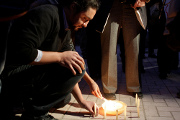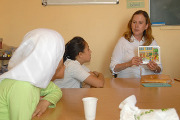‘We . . . should strive to overcome evil with good,’ archbishop says
Okene, Nigeria, 4 September 2012, (Open Doors News) — The church is still empty. Clothes and bibles remain scattered throughout the sanctuary. Dried blood stains the floor.
One month after gunmen opened fire inside Deeper Life Bible Church in Eika-Adagu, a suburb 12 kilometers from the town of Okene in central Nigeria’s Kogi state, members of the church have yet to resume worship services and other activities.
“All of us are traumatized by this attack. [There is] no family in this church that is not affected by this incident,” Stephen Imagejor, an assistant pastor, told Open Doors News. Imagejor’s wife, Ruth, was killed. Their two daughters, Amen, 12, and Juliet, 9, were hit by bullets and hospitalized. In all, 19 died.
Police have played down widespread suspicion that the militant group Boko Haram was behind the attack, and the group itself has not claimed responsibility, as it has after other deadly outbursts. Members of the church, however, say they have no doubt it was Boko Haram that came after them specifically because of their Christian faith. They may have been a target, they say, because some of the dead include former Muslims who had converted to Christianity. And in the aftermath, church leaders say members struggle with the Gospel’s admonition to forsake revenge.
“Many are now saying that they can no longer come to the church,” Imagejor said. “But we will eventually try to see how we can get those of us that have survived the attack to return to the church for worship services. But, I do visit them to encourage them to remain steadfast in the faith in spite of the persecution.”
Aug. 6, 2012
It was a Monday. Bible-study day.
Deeper Life members and their families gathered at the church in the evening. Pastor Williams Kumuyi, general superintendent of the Church, was delivering a message via satellite broadcast. It was 7:30 p.m.
Outside the building, a Toyota van rolled up. A group of men — some news reports said as many as 10 — got out. Some carried assault rifles.
“Suddenly the lights in the church went off,” said Faith Isaac Yusuf, who was inside. “A member went out to find out what the problem was and just as we waited for the lights to be fixed, we heard a voice shouting at us to hands up. And then they began shooting us.”
The gunfire lasted 20 minutes.
“I ran out of the church. Honestly I cannot say how I got out, but I know I escaped from the church as the guns burst out with fire and bullets,” Yusuf told Open Doors News in her house at Eika-Adagu.
Her son, Matthew Isaac Yusuf, a high school student, was killed. Another son, Michael Isaac Yusuf, was injured.
When the shooting began, Imagejor hit the floor. “I crawled out as the gunmen began shooting. I crawled along the wall in the dark until I broke through a zinc sheet used to block a door in the children’s section and out of the church. That was how I escaped.”
Outside, he looked across the road. His eyes found Jesse, his 8-year-old son.
“His was a miraculous escape as I saw him across the road without knowing how he got out of the place,” Imagejor said.
Too many others did not get out: Martha Joseph. Aderuwa Joseph. Lydia Michael. Mary David. Emmanuel Ambe, a senior pastor of the Church, who was visiting for a brief meeting.
“I was hit on the leg, while my wife, Grace, was shot death,” said Samuel Ayodele Yusuf, one of the pastors at Deeper Life.
Church member Stephen Isaiah Yusuf survived the attack. His mother, Mary Isaiah Yusuf, did not. Still in shock a month later, he could not recall details.
Seventeen members of the church were killed on the spot. Two died in the hospital. About thirteen members remain in two hospitals: General Hospital, Okene; and Lokoja Federal Medical Centre.
‘We cannot run away’
Immediately, suspicion fell upon Boko Haram, the militant group that has waged violence across Nigeria in an attempt to topple the government in favor of an Islamic state. Boko Haram has attacked Christian churches elsewhere, mainly in the northern portions of Nigeria. The assault on Deeper Life Church was farther south than typical.
Police have made a handful of arrests, but have not revealed whether any of the suspects have ties to Boko Haram. The police commissioner for Kogi state, Mohammadu Katsina, flatly ruled out any religious motive:
"There is no Boko Haram in Okene,” Kastina told the Nigerian newspaper This Day. Instead, he said the deadly events of Aug. 6 were "a pure case of armed robbery and political attack.”
The surviving members of Deeper Life aren’t buying it.
“No member of our church has been involved in politics and there is, therefore, no justifiable reason for anyone to attack us,” said Samuel Ayodele Yusuf. “So the claim that it is not Boko Haram is not acceptable to us.”
The attack in Okene was too similar to others to dismiss suspicion of Boko Haram out of hand, said the Most Rev. Emmanuel Egbunu, The Anglican Archbishop of Lokoja Province of the Church of Nigeria, Anglican Communion, and the Chairman of the Christian Association of Nigeria, Kogi State Chapter.
“This is not the first time that a Church is being attacked in this state, as there have been attempts in the past to bomb churches here,” Egbunu told Open Doors News. “We are not surprised about this attack because attack on churches has been the trademark of this Islamic sect, Boko Haram.”
“There are claims by security agencies that the attack may be politically induced,” he said, “but the question we have been asking is why should the Church become the target of an attack when the Church is not involved in politics? We believe that this attack is premeditated.”
One reason why, church members said, is the fact that several of the Deeper Life members who were killed had previously converted from Islam to Christianity.
“My wife, Ruth, 46, became a Christian in 1988,” said Imagejor, the assistant pastor. “She was a Muslim before she converted to the Christian faith. And through her life in Christ, her mother and two of her Muslim sisters also converted to Christianity.”
Mary Isaiah Yusuf was a former Muslim, too, said her husband, Isaiah. “She became a Christian when she heard the gospel preached to her. She also shared the gospel with her relations who in turn, gave their lives to Christ.”
He said the two married in 1982 in the city of Kaduna when Mary became a Christian. The couple had six children, and Mary was involved in the church’s team of prayer warriors. She was responsible for the daily cleaning of the church sanctuary.
“We were living in Kaduna in northern part of the country, but the religious crisis caused by the forceful implementation of the Islamic law, Sharia, forced us to relocate to Kogi state in 2001,” Isaiah said. “We thought we were fleeing persecution up north, but now this attack has shown us that we cannot run away from it.”
The challenge of the Scripture
The attacks on churches are taking a toll on Christian life. Churches are changing from houses of welcome to houses of suspicion, Archbishop Egbunu said. Money that should go to evangelism instead is being channeled into security measures. As the sectarian violence creeps southward into Nigeria’s predominantly Christian regions, he said, worries grow about the country’s ability to police itself.
Egbunu said it’s creating a situation where Christian leaders will not be able to contain the anger building in the hearts of some Christians.
“As Church leaders we preach and tell Christians not to avenge these attacks,” he said. “But it is possible that we may not be able to restrain them for a long time. Things are getting out of hand. We as leaders may restrain ourselves, but Christian youths may not be able to bear things for long. But our message has been that we should not be overcome with evil, but should strive to overcome evil with good, as we are taught in Romans 12:1.”
Therefore, I urge you, brothers and sisters, in view of God’s mercy, to offer your bodies as a living sacrifice, holy and pleasing to God—this is your true and proper worship.
Rom. 12:1 NIV
END
VIDEO LINKS
**********
Copyright 2012 Open Doors News





